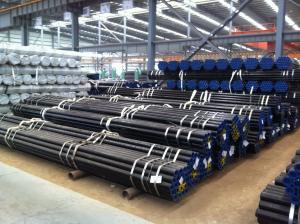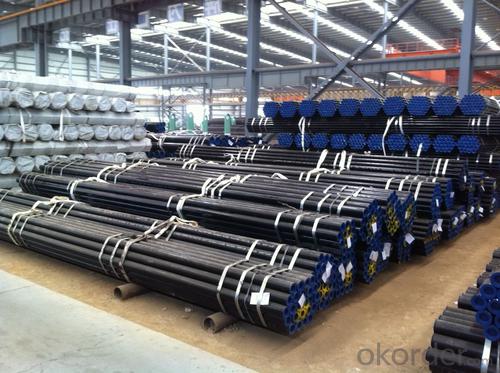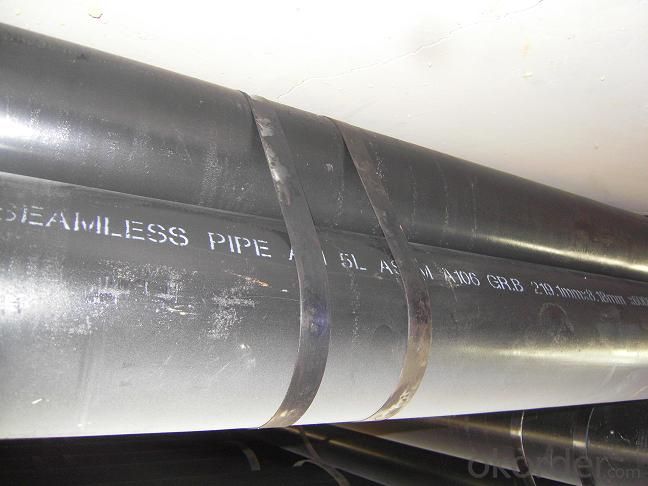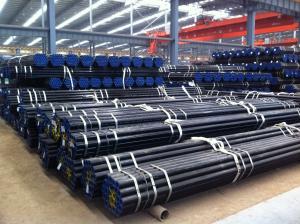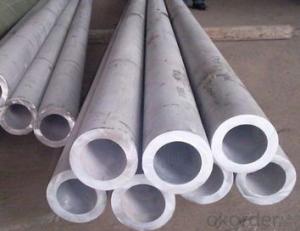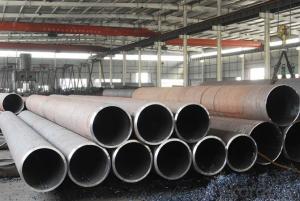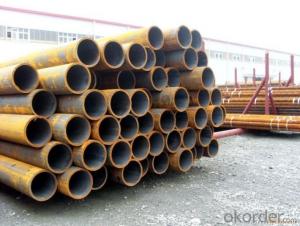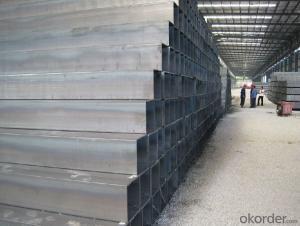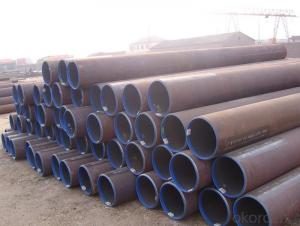API 5L Carbon Seamless Steel Pipe for 5 Inch Hot Sales
- Loading Port:
- Tianjin
- Payment Terms:
- TT OR LC
- Min Order Qty:
- 25 m.t.
- Supply Capability:
- 1000 m.t./month
OKorder Service Pledge
OKorder Financial Service
You Might Also Like
Product Description:
1、Structure of API 5L Carbon Seamless Steel Pipe for 5 Inch Hot Sales:
Seamless pipe is formed by drawing a solid billet over a piercing rod to create the hollow shell. As the manufacturing process does not include any welding, seamless pipes are perceived to be stronger and more reliable. Historically seamless pipe was regarded as withstanding pressure better than other types, and was often more easily available than welded pipe.
2、Main Features of API 5L Carbon Seamless Steel Pipe for 5 Inch Hot Sales Application:
• High manufacturing accuracy
• High strength
• Small inertia resistance
• Strong heat dissipation ability
• Good visual effect
• Reasonable price
3、API 5L Carbon Seamless Steel Pipe for 5 Inch Hot Sales Images:
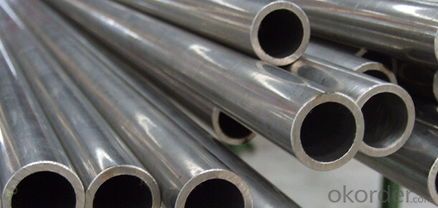
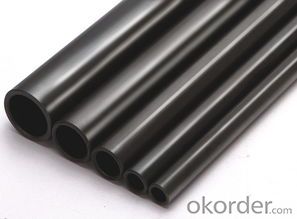
Packaging & Delivery
Packaging Details: | seaworthy package,bundles wrapped with strong steel strip |
Delivery Detail: | 15-30days after received 30%TT |
4、API 5L Carbon Seamless Steel Pipe for 5 Inch Hot Sales Specification:
Standard | GB, DIN, ASTM |
Grade | 10#-45#, 16Mn |
Thickness | 8 - 33 mm |
Section Shape | Round |
Outer Diameter | 133 - 219 mm |
Place of Origin | Shandong, China (Mainland) |
Secondary Or Not | Non-secondary |
Application | Hydraulic Pipe |
Technique | Cold Drawn |
Certification | API |
Surface Treatment | factory state or painted black |
Special Pipe | API Pipe |
Alloy Or Not | Non-alloy |
Length | 5-12M |
Outer Diameter | 21.3-610mm |
Grade | 20#, 45#, Q345, API J55, API K55, API L80, API N80, API P110, A53B |
Standard | ASME, ASTM |
1.Material:20#(ASTM A 106/A53 GRB.API5LGRB,GB),45#,16Mn,10#.
2.Specification range:OD:21.3-610mm,WT:6-70mm,length:6-12m or according to the requirement of clients.
3.Excutive standards:GB,ASME API5L.ASTM A 106/A53,Despite of the above standards,we can also supply seamless steel pipe with standard of DIN,JIS,and so on,and also develop new products according to the requirements of our clients!
4.Surface:black lacquered,varnish coating or galvanized.
5.Ends:Beveled or square cut,plastic capped,painted.
6.Packing:bundles wrapped with strong steel strip,seaworthy packing.
5、FAQ of API 5L Carbon Seamless Steel Pipe for 5 Inch Hot Sales:
①How is the quality of your products?
Our products are manufactured strictly according to national and internaional standard, and we take a test
on every pipe before delivered out. If you want see our quality certifications and all kinds of testing report, please just ask us for it.
Guaranteed: If products’ quality don’t accord to discription as we give or the promise before you place order, we promise 100% refund.
②How about price?
Yes, we are factory and be able to give you lowest price below market one, and we have a policy that “ for saving time and absolutely honest business attitude, we quote as lowest as possible for any customer, and discount can be given according to quantity”,if you like bargain and factory price is not low enough as you think, just don’t waste your time.Please trust the quotation we would give you, it is professional one.
③Why should you chose us?
Chose happens because of quality, then price, We can give you both.Additionally, we can also offer professional products inquiry, products knowledge train(for agents), smooth goods delivery, exellent customer solution proposals.Our service formula: good quality+good price+good service=customer’s trust
SGS test is available, customer inspection before shipping is welcome, third party inspection is no problem.
Any question, pls feel free to contact us !
- Q: Can steel pipes be used for underground telecommunications networks?
- Yes, steel pipes can be used for underground telecommunications networks. Steel pipes are commonly used in underground applications due to their strength, durability, and resistance to corrosion. They provide protection and support for the telecommunication cables and can withstand the external pressure and load that occur underground. Additionally, steel pipes can be coated with protective materials to further enhance their resistance to corrosion and extend their lifespan. Overall, steel pipes are a reliable choice for underground telecommunications networks.
- Q: What is the shear strength of steel pipes?
- The shear strength of steel pipes can vary based on a variety of factors including the grade and thickness of the steel, as well as the manufacturing process and any additional treatments or coatings applied. Steel pipes generally possess a high shear strength due to the inherent strength of steel as a material. Determination of shear strength is typically achieved through testing and can range from 50,000 to 80,000 pounds per square inch (PSI) for common grades of steel pipes. However, it is important to acknowledge that the shear strength can be considerably higher for specialized or higher-grade steel pipes that are specifically designed for applications such as offshore drilling or high-pressure systems. Therefore, it is advisable to refer to the manufacturer's specifications or engineering standards for precise and specific shear strength values for a particular steel pipe.
- Q: Can steel pipes be used for underground applications?
- Yes, steel pipes can be used for underground applications. Steel pipes are highly durable and can withstand the pressure and corrosion that may be encountered in underground environments. They are commonly used for various underground applications such as water supply, sewage systems, and underground utility lines.
- Q: How are steel pipes used in the defense sector?
- Steel pipes are used in the defense sector for various purposes such as constructing military infrastructure, manufacturing weapons, and creating protective barriers. They are often utilized in the construction of military bases, ammunition storage facilities, and communication systems. Steel pipes are also crucial for manufacturing armored vehicles, artillery, and missile systems. Additionally, they are employed in creating barriers and fortifications to enhance security and defense capabilities.
- Q: How do you calculate the pipe friction loss for steel pipes?
- In order to determine the pipe friction loss for steel pipes, one must utilize the Darcy-Weisbach equation. This particular equation is widely employed in the field of fluid dynamics to ascertain the drop in pressure or friction loss that arises from the flow of fluid through a pipe. The equation is formulated as follows: The pressure drop or friction loss (ΔP) can be calculated by dividing the product of the Darcy friction factor (f), the length of the pipe (L), the density of the fluid (ρ), and the square of the velocity of the fluid (V²), by twice the diameter of the pipe (D). The Darcy friction factor (f), which is a dimensionless value, is contingent upon the Reynolds number (Re) and the relative roughness (ε/D) of the pipe. Here, ε represents the absolute roughness of the pipe. There are various correlations or Moody's diagram that can be employed to determine the friction factor. Once the friction factor has been ascertained, the values for length, density, velocity, and diameter can be substituted into the equation to calculate the pressure drop or friction loss. It is of utmost importance to ensure that the units for all variables remain consistent (e.g., length in meters, density in kg/m³, velocity in m/s, diameter in meters) in order to achieve precise results. By utilizing this equation and acquiring the requisite parameters, it becomes possible to calculate the pipe friction loss for steel pipes. Such calculations are essential in the design and analysis of fluid flow systems.
- Q: What is the difference between internal coating and external lining of steel pipes?
- Steel pipes can be protected from corrosion and damage through two different methods: internal coating and external lining. When it comes to internal coating, a protective layer or coating is applied to the inner surface of the steel pipe. This is done to prevent corrosion or damage caused by the fluid or substance being transported through the pipe. Common materials used for the coating include epoxy, polyurethane, or polyethylene. These materials create a barrier between the pipe and the transported material, thus extending the pipe's lifespan and preserving the quality of the transported material. On the other hand, external lining involves applying a protective layer or lining to the outer surface of the steel pipe. The purpose of this is to shield the pipe from external elements like soil, moisture, chemicals, and physical damage. Materials such as polyethylene, polypropylene, or fusion-bonded epoxy are typically used for the external lining. By acting as a barrier, the lining prevents corrosive substances from coming into contact with the pipe and causing harm. Additionally, it helps maintain the pipe's structural integrity and prevents the formation of leaks or cracks. To summarize, the main distinction between internal coating and external lining of steel pipes lies in where the protective layer is applied. Internal coating focuses on the inner surface of the pipe, while external lining concentrates on the outer surface. While both methods aim to safeguard the pipe from corrosion and damage, they address different aspects of pipe protection.
- Q: Can steel pipes be used for transporting drinking water?
- Yes, steel pipes can be used for transporting drinking water. However, it is important to ensure that the steel pipes are properly coated and protected to prevent any corrosion or leaching that could contaminate the water. Additionally, regular maintenance and monitoring of water quality should be conducted to ensure the safety of the drinking water.
- Q: Are steel pipes suitable for pharmaceutical manufacturing facilities?
- Yes, steel pipes are suitable for pharmaceutical manufacturing facilities. Steel pipes are highly durable, resistant to corrosion, and can withstand high temperatures and pressures. They are also easy to clean and maintain, ensuring the integrity and safety of pharmaceutical processes. Additionally, steel pipes are compatible with a wide range of chemicals and pharmaceutical products, making them a reliable choice for pharmaceutical manufacturing facilities.
- Q: What are the different pressure ratings for steel pipes?
- The different pressure ratings for steel pipes can vary depending on factors such as pipe size, wall thickness, and the type of steel used. Common pressure ratings for steel pipes range from 150 psi (pounds per square inch) to 2500 psi or higher.
- Q: What are the different types of steel pipe elbows?
- There are several different types of steel pipe elbows, including 45-degree elbows, 90-degree elbows, and 180-degree elbows. These elbows are used to change the direction of the flow in a piping system and are available in various sizes and materials to suit different applications and requirements.
Send your message to us
API 5L Carbon Seamless Steel Pipe for 5 Inch Hot Sales
- Loading Port:
- Tianjin
- Payment Terms:
- TT OR LC
- Min Order Qty:
- 25 m.t.
- Supply Capability:
- 1000 m.t./month
OKorder Service Pledge
OKorder Financial Service
Similar products
Hot products
Hot Searches
Related keywords
